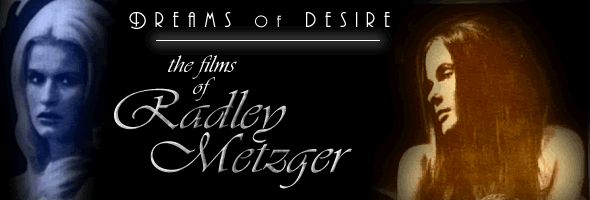

| FILMOGRAPHY
1959 The Immoral Mr. Teas 1961
1965
1967
1968
1969
1970
1972
1973
1975
1976
1977
Maraschino Cherry 1978
1981
1984
|
by
Nathaniel Thompson
Provacative. Elegant. Erotic. Shocking. In today's world of cable erotic thrillers and arthouse movies of the week, these terms get thrown around so much they have lost their meaning. In the 1960s, however, many films lived up to these claims and were still able to break cinematic ground few imagined possible. Surprisingly, most of these films and their creators still hold up today, and few have fared better with the passing of time than director Radley Metzger. A native New Yorker, Metzger was born on January 21, 1929. After a stint in college at New York's City College and Columbia, he entered the Air Force where he served with future composer Laurence Rosenthal, who eventually scored Metzger's first film, Dark Odyssey. According to a now familiar anecdote, Metzger's love for film flourished due to the countless days he spent in movie houses to savor the air conditioning which relieved his childhood hay fever; as a result, he was exposed to all of the significant world directors and found this influence paying off after his military service when he began doing TV commercials and cutting trailers for Janus Films. As a result, he found himself studying the films of Ingmar Bergman, Francois Truffaut, and Michelangelo Antonioni, to name just a few. Metzger progressed to actual film editing and started his own distribution company, Audubon Films, with his partner, Ava Leighton. While Metzger's first film, 1957's Dark Odyssey, a self-described labor of love, stands apart from his other work due to its stark, tragic quality, his maiden cinematic voyages as director under the Audubon banner quickly established what has become known as the Metzger style. Both The Dirty Girls and The Alley Cats reflected the tone of such Audubon-distributed hits as I, a Woman (an erotic Swedish import) and I Spit on Your Grave (a French film dealing with Southern racism whose title was later appropriated for the infamous 1978 shocker). However, Metzger pushed the material further by adding dazzling, globe-hopping European settings and sharp, witty dialogue, delivered by beautiful people in beautiful settings. With 1967's Carmen, Baby, Metzger scored a direct hit, delivering a widescreen, colorful canvas of erotic tragedy in which editing and acting managed to generate heat on the screen while revealing only the slightest amount of flesh. An adaptation of Bizet's Carmen, this was really the first of several glossy literary spins which continued with 1968's lesbian coming of age classic, Therese and Isabelle, which featured I, a Woman star Essy Persson as a woman remembering her first boarding school love affair. Over the next two years Metzger then delivered perhaps the two finest erotic art films ever made: Camille 2000 and The Lickerish Quartet. Visually dazzling, perfectly edited, magnificently performed, and vividly scored, these films managed to cross over to mainstream critical acceptance and still look as ravishing and fresh now as when they were first released. Rather than falling into a pattern, however, Metzger surprised audiences with Little Mother, a stylized retelling of the true story of Argentinian Eva Person, and Score, the story of two couples experimenting with bisexuality in an idyllic European village. With Score and his next film, The Punishment of Anne (The Image), Metzger flirted with brief sequences of hardcore, the upcoming trend in 1970s erotic cinema after the wild success of Deep Throat. However, when he made a five-film sojourn into full-fledged explicit sex under the name of Henry Paris, Metzger continued to deliver beautifully crafted and often witty little gems which stood out as the best of their genre. The Private Afternoons of Pamela Mann continuously pokes fun at every porn cliche in the book, while The Opening of Misty Beethoven, an adaptation of George Bernard Shaw's Pygmalion, features perhaps the finest script, acting, and setpieces of any adult film. In 1978, Metzger tackled a commercial mainstream thriller, a remake of the silent horror classic, The Cat and the Canary. Shot in the same house used for The Omen, Metzger's film managed to pack reams of palpable Gothic atmosphere into its compact running time and proved his filmmaking skill could be applied to any genre and style. While Metzger's cinematic touch was last in evidence with The Princess and the Call Girl, a bubbly twist on Mark Twain made for cable's Playboy Channel, he has remained busy ever since and has currently overseen the recent releases of his films on home video. Soon even his Henry Paris titles will be issued in remastered versions, so Metzger's followers will have even more cause to rejoice by the arrival of 2000. Following the death
of Ms. Leighton, Metzger also turned his attention to homeopathic medicine
and even prepared a video series on alternative medicine. His concern
for the celebration of life and art remains in full force whether it be
through his films or his day to day activities, and anyone unfamiliar with
his body of work should seek him out at their local video store as soon
as possible. When discussing The Lickerish Quartet, Metzger
expressed his fondness for the film's German title, which translates as
"dream play:" "Dream plays shouldn't age. Dreams don't age; they
hang in a little box of immortality." Indeed, this description could
apply to all of his work, which remains as beguiling and timeless as ever,
immortal in the thoughts of moviegoers everywhere who continue to enjoy
and study his work.

The
films of Radley Metzger are available on VHS from First
Run Features and on DVD from Image
Entertainment.
To
learn more about Radley Metzger and his films, we highly recommend Mondo
Erotico, devoted to the works of Metzger, Jess Franco, and Walerian
Borowczyk.
|